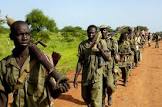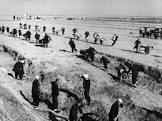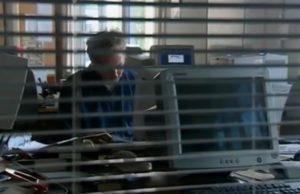- ‘It’s the new economy, stupid…’ - 27th February 2026
- Eyes right… - 26th February 2026
- Opposites attract - 26th February 2026

During 41 years in journalism (when he was trained to use simple language, avoiding jargon) our Editor, Welshman Phil Parry, who spent 23 years with the BBC, has always been angered at the double-standards in news when a tragedy involving hundreds of foreigners counts for less than a crash on Anglesey when three people died, or the death of a child in Swansea, and now this is underlined by reports of an unfolding famine in Africa creating a huge number of victims.
What is happening today only emphasises what I have known all along.

A terrible famine is developing in Sudan with a child dying every hour.
However for the news media, it is worse, apparently, that a fatal accident took place on Anglesey, or that a child died in Swansea.
This was the report about the crash on the website of BBC Cymru Wales (BBC CW): “Two men and a woman were killed when a car crashed into pedestrians visiting a popular seaside town.

“The crash involving an Audi happened at Alma Street near Beaumaris Pier on Anglesey…”.
Here is Sky News on Friday about the child dying: “A murder investigation has been launched after the suspicious death of a child in south Wales.
“South Wales Police has confirmed a child died at a house in the Gendros area of Swansea.

“Emergency services were called to Cwm Du Close at 8.30pm…”
Yet as bad as these events are, the disaster happening in the refugee camp of Zamazan on the outskirts of the city of el-Fasher is FAR worse – it is probably more terrible than the famine in Ethiopia.
For only the third time in the past 20 years, the UN has declared a full-blown famine.


But it is not just Zamzam that is suffering a horrifying catastrophe.
The camp has been singled out solely because it is one of the few places in war-torn Sudan about which the UN have reliable information.
In fact, famine is consuming much of the country.

If much more help does not arrive very soon, it may prove the worst anywhere in the world since millions starved to death during China’s ‘Great Leap Forward’ in the late 1950s and early 1960s.
In May the Clingendael Institute, a Dutch think-tank, released a report which estimated that hunger and related diseases would kill more than two million people in Sudan by the end of the year.
Timmo Gaasbeek, the report’s author, has since extended his projections to cover the next two years.

In an “optimistic scenario”, in which fighting stops and this year’s harvest, expected next month, is slightly better than the last, he predicts around six million “excess deaths” by 2027.
In the (more likely) scenario in which fighting continues until early next year, more than 10 million may perish.
Although some experts have lower estimates, there is an emerging consensus that without decisive action Sudan faces mass starvation on a scale not seen in decades.

Yet a crash which killed three people in Beamaris or the suspicious death of a child in Swansea, get far more media attention…
The memories of Phil’s extraordinary decades long award-winning career in journalism (including his many years in news when these sorts of standards prevailed) as he was gripped by the rare neurological disabling condition Hereditary Spastic Paraplegia (HSP), have been released in a major book ‘A Good Story’. Order it now.

Tomorrow – why a senior Conservative politician has attacked his own party in Wales when figures reveal that a leading colleague’s support staffing costs are more than TWICE Labour’s, and the group’s Welsh leader has racked up the highest number of any MS (Member of the Senedd).










